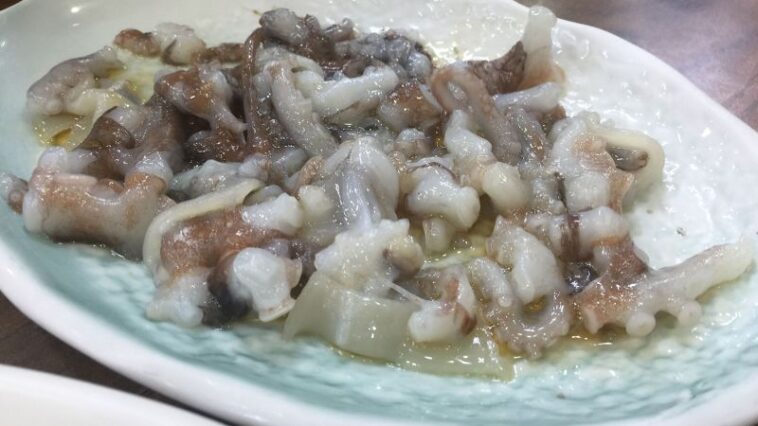# 82-YEAR-OLD MAN IN SOUTH KOREA SUFFERS HEART ATTACK AFTER EATING « LIVE OCTOPUS »
An 82-year-old man in South Korea recently suffered a heart attack after choking on a piece of « live octopus, » also known as san-nakji. This local delicacy is made up of freshly severed tentacles that are still wriggling. The incident occurred in Gwangju, a city near the country’s southern tip, and the man experienced a cardiac arrest upon arrival of first responders. Although it is not confirmed whether the man survived, this event brings attention to the potential dangers associated with consuming this unusual dish.
SAN-NAKJI: A LOCAL DELICACY WITH A CONTROVERSIAL REPUTATION
San-nakji is a small octopus that is sliced and served raw, often enjoyed in South Korea’s coastal areas or seafood markets. Despite the dish’s name translating to « live octopus, » the octopus is actually killed before serving, with its tentacles cut into portions. However, the freshness of the dish causes the tentacles’ nerves to remain active, resulting in the appearance of the octopus being « live » as they continue to move on the plate. The dish is typically served with sesame oil, sesame seeds, and sometimes ginger, and has a chewy texture.
This unique dining experience has gained attention worldwide, even making an appearance on Anthony Bourdain’s CNN series « Parts Unknown » in 2015. However, san-nakji has also been linked to several cases of diners choking or asphyxiating on the tentacles. Local media has reported multiple incidents of individuals dying after consuming the dish, with one infamous case resulting in a man being sentenced to life imprisonment in 2012 for allegedly using the dish as a cover for murder.
THE DANGERS OF EATING LIVE OCTOPUS
The incident involving the 82-year-old man serves as a reminder of the potential risks associated with consuming live octopus. The chewy texture and the tentacles’ continued movement on the plate make san-nakji a unique and visually striking dish. However, the dish’s controversial reputation due to the risks of choking or asphyxiation highlights the importance of exercising caution when consuming such delicacies.
It’s important to note that the chewy texture and continued movement of the octopus on the plate may pose a potential choking hazard, especially for those who may have difficulty swallowing or who are not accustomed to the dish’s unique characteristics. As such, individuals should be mindful when indulging in this particular seafood delicacy to ensure their safety.
In conclusion, the incident involving the 82-year-old man in South Korea serves as a sobering reminder of the potential dangers associated with consuming live octopus. While the dish may be a cultural delicacy with a visually striking presentation, it is crucial for individuals to approach it with caution due to the inherent risks involved. As with any cuisine, it’s essential to be mindful of the potential hazards to ensure a safe and enjoyable dining experience.
References:
– https://news.kbs.co.kr/news/pc/view/view.do?ncd=2688597
– https://www.koreatimes.co.kr/www/nation/2023/10/113_122121.html
– https://www.koreatimes.co.kr/www/nation/2023/07/113_142704.html



